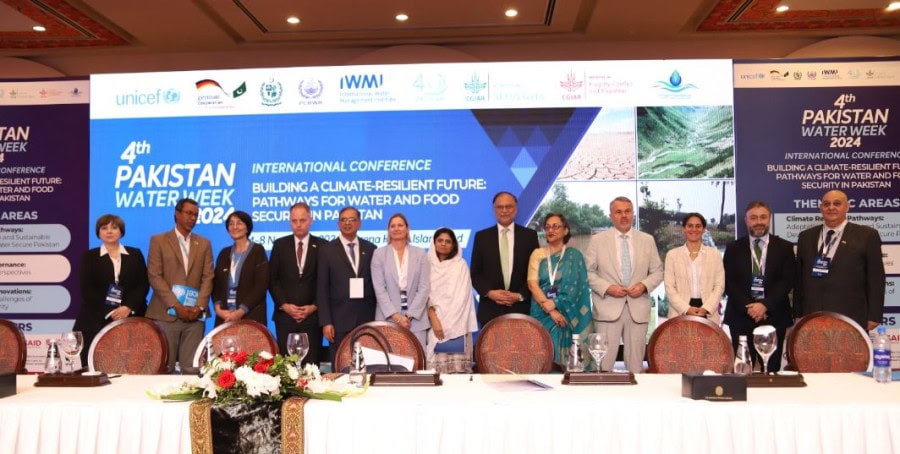ISLAMABAD — Pakistan Water Week 2024, a five-day international conference that will bring together water scientists, academics, government officials, representatives of development agencies, and policy experts from home and abroad to discuss the country’s water issues, started on Monday.
The conference will run until Friday in the federal capital, and will focus on theme “Building a Climate-Resilient Future: Pathways for Food, Water, and Food Security in Pakistan.” It was organized by the International Water Management Institute (IWMI) Pakistan to celebrate its 40th anniversary.
This event is held in collaboration with the Pakistan Council of Research in Water Resources (PCRWR) and the CGIAR Research Program on Water, Land, and Ecosystems (WLE), along with support from USAID, the FCDO, and UNICEF.
Minister for Planning, Development, and Special Initiatives Ahsan Iqbal, also the chief guest, reiterated the government’s commitment to addressing pressing water management and food security issues.
The minister emphasized that our water resources are vital for life and are the foundation for food security, economic stability, and social well-being. Over 30 international experts in water and climate are attending the event in person, with an additional 50 participating virtually. This gathering offers a significant opportunity to exchange ideas and promote the collaborative spirit necessary for building a sustainable future for Pakistan.
He stated that water and food security are critical challenges of our time, affecting billions of people worldwide. According to the World Bank, over 2.2 billion individuals lack access to safe drinking water. In Pakistan, the situation is even more alarming. Our per capita water availability has significantly decreased from 5,600 cubic meters in the 1950s to under 900 cubic meters today, which is well below the water scarcity threshold of 1,000 cubic meters per person.
Pakistan’s adaptation needs are estimated to be between 7 billion and 14 billion dollars annually until 2050. Additionally, the country’s transition to renewable energy is projected to cost about 165 billion dollars by 2040. “These figures highlight the urgent need for significant investments in climate resilience and emphasize the importance of international support to help Pakistan tackle the increasing challenges presented by climate change, ” he added.
Moreover, Pakistan has one of the world’s largest irrigation systems, covering approximately 17 million hectares. Yet this system faces multifaceted challenges from population growth, industrialization and environmental degradation. Today, agriculture consumes over 90% of our water resources. “However, we still face inefficient irrigation practices and significant water losses estimated at up to 40%. The impacts of climate-induced events, including floods, droughts, and glacial melts, have affected over 40 million people in the past decade alone, with losses estimated to exceed far more significant than 30 billion dollars, ” he lamented.
He said we have made significant investments to safeguard Pakistan’s resources. Our national water policy, launched in 2018, outlines strategic goals and targets to achieve sustainable water management by 2030. Today, we allocate 12.2% of the public sector development program to water resources, with rupees 98 billion dedicated to the critical sector in the current fiscal year alone.
“I encourage the International Water Management Institute to collaborate with the planning commission in formulating a scientific roadmap to tackle the environmental, climate, and social challenges impacting Pakistan’s water and food security,” he stated.
Federal Secretary, Minister of Water Resources, Syed Ali Murtaza stressed the urgent need to tackle the complex issues facing Pakistan’s water sector. During the discussion, he maintained that addressing these challenges requires comprehensive solutions beyond technical considerations.
Water governance is a critical issue that must be prioritised to manage the nation’s water resources effectively. “We are familiar with the issues, including seasonal changes, droughts, and water scarcity,” Murtaza stated.
Recognising water as a vital resource for production and a crucial component of the environmental cycle, Murtaza noted that the government of Pakistan has identified water as a key priority due to its essential role in economic development. “The life of people in Pakistan depends on water, particularly in agriculture, where our extensive irrigation system plays a significant role,” he said.
Director General IWMI Mark Smith, a keynote speaker at the event, highlighted that collaboration and innovative strategies are essential for achieving climate-resilient solutions in a world increasingly affected by climate change.
Mark Smith emphasized the urgent need for collective action among water community partners to address the growing uncertainties surrounding our water resources.
The global water cycle is dangerously out of balance, leading to heightened risks, including changing river flows, severe climatic shifts, and prolonged droughts. As these extremes become more frequent, effective management strategies are critical. “The water community plays a pivotal role in tackling the uncertainties of the future,” Smith stated.
Unpredictable weather patterns, from La Niña to El Niño, have intensified the impacts of climate change, resulting in heavy rainfall and droughts that disrupt ecosystems and production systems. As these fluctuations continue, the implications for global water security are profound.
While scientific advancements are crucial, Smith warned that they are not enough alone. “Collective actions across sectors and communities are essential to confront these challenges,” he noted.
Director, Water, Food, and Ecosystem at IWMI, Dr Mohsin Hafeez, shared Pakistan Water Week, an initiative to strengthen stakeholder relationships and foster innovative solutions to the country’s pressing water security challenges.
“Water security is vital for Pakistan’s future. Through this event, we aim to bring together experts, policymakers, and community leaders to address the critical issues surrounding our water resources collaboratively, ” Mohsin remarked.
“We look forward to engaging in discussions and collaborative efforts that will lead to sustainable solutions for water management in Pakistan,” Dr Hafeez stated. We can ensure a secure water future for our communities and the environment.
Dr. Iskandar Abdullaev, the Country Representative of IWMI, and Ms. Simi Kamal, the Board Chair of IWMI, also spoke.
The first-of-its-kind conference will have 13 thematic sessions throughout the weeklong program. It will also focus on digital innovations, climate-resilient solutions, and nature-based solutions, and the role of women’s leadership and the media in the context of water will also be explored.










